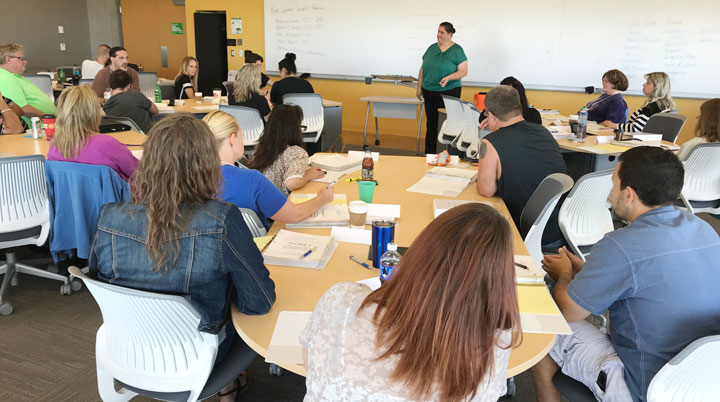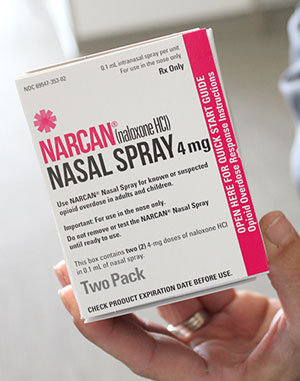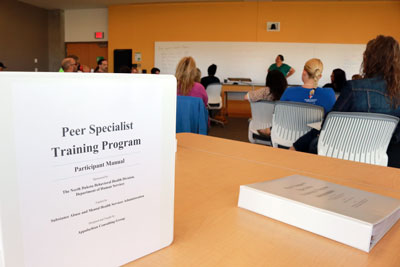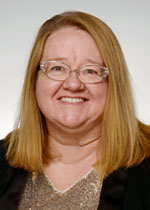Saving Lives
Peer Support Specialist Training Program Already Making an Impact
By Brenda Haugen on
When Jean Dukarski took a box of naloxone nasal spray offered during one of the sessions of North Dakota's Peer Support Specialist (PSS) Training Program, she didn't expect she'd soon be using it to save a life.
I am so grateful that when they did the demonstration at the training that they offered one [a box of nasal spray] to me as well. It not only saved one person's life, it changed the mindset of all of my employees and may save others in the future.
"I am so grateful that when they did the demonstration at the training that they offered one [a box of nasal spray] to me as well," Dukarski said. "It not only saved one person's life, it changed the mindset of all of my employees and may save others in the future."
Dukarski was actually one of the trainers from the Appalachian Consulting Group assisting North Dakota with developing its PSS Training Program. The program is a Behavioral Health Workforce Development Project. The Center for Rural Health at the University of North Dakota School of Medicine & Health Sciences was contracted by the North Dakota Department of Health & Human Services to develop peer support and a Behavioral Health Workforce plan. Since January, 11 people have been trained as PSS trainers. Through August, the state already had sponsored four PSS trainings across North Dakota. A total of 112 people, most of whom came from rural areas, have earned PSS certification.

After completing the training program and earning certification, peer support specialists can use their experiences of recovery from addition and/or mental illness to help others going through the recovery process. That can involve sharing personal experiences to engage peers in their recovery and advocating for them when the need arises; facilitating peer support groups; helping those in recovery navigate community resources, such as employment assistance, housing, and education; and working with the individuals' care teams to develop plans to help them meet their personal goals and avoid relapse.
Julie Flaten of Park River, North Dakota, participated in the training program in Grand Forks. As a young mother struggling with addiction, she didn't have peer support in her journey through recovery.
"I know what it feels like to be put down," she said.
Flaten wants to be an advocate and support so others don't feel alone, like she once did. Flaten said it also helps her on her own journey to realize just how far she's come.

Toward the end of the PSS training, NARCAN® is distributed to those who want it. NARCAN® is a nasal form of naloxone, which can be used for the emergency treatment of opioid overdoses. After the training session, Dukarski took one and brought it back to her "day job," where she serves as the program director for a peer-run agency in Michigan.
"That is where the incident took place," she said. "You see, we had been discussing getting it for our agency, but many of the employees were concerned about it and felt it wasn't something we 'needed.' I gave it to my employee that I felt would be most willing and confident about having it and using it. We did the online training for the administration of NARCAN® and talked about how we don't want to think we will need it, but this way we will have it on hand.
"On May 21, an individual who attends our center passed out and was barely breathing. The person began to turn blue. My employee went to her office and grabbed the NARCAN®. She administered both doses before the person started breathing again. When emergency medical services arrived, they said that there was no doubt that the person would not have made it without it."
The incident changed the minds of those who had doubted it necessary to keep naloxone around.
The sense of relief experienced by all of my staff cannot be overstated.
"The sense of relief experienced by all of my staff cannot be overstated," Dukarski said. "Having what we needed on hand, that actually saved this person's life, has had a lasting impact as well. We have since found a local source. The same employees that were so afraid of having it on hand and in denial of the possibility of needing it, now each have NARCAN® in their desk drawer. Seeing it save a life has pushed away all of those other concerns.
"I still hope that we never need it again, but it is good to know if the situation arises, we have what we need."

The peer support specialists going through training also appreciate that they are learning skills they need to help others. They know how tough recovery is—they've lived it. They hope the challenges they've faced and skills they've learned will help make the journeys of others easier.
"I want to be able to help other people," said Debra Camperud of Grand Forks. "This isn't the end. There's always tomorrow."
One of Camperud's PSS classmates was John Campbell, dean of students with Dakota Boys and Girls Ranch. Campbell works with youth in grades 7 through 12, making sure they have an advocate in their corner and referring them to other services as needed. He took the PSS training to help continue to bring the culture of recovery to those children. He also has done recovery coaching through the city of Fargo.
North Dakota is doing an amazing job of rolling out their Peer Specialist Training Program. Beyond just the NARCAN® piece, this program will save lives.
Dukarski said North Dakota's PSS Training Program is definitely going on the right track.
"North Dakota is doing an amazing job of rolling out their Peer Specialist Training Program," Dukarski said. "Beyond just the NARCAN® piece, this program will save lives."
This article originally appeared in the Fall 2018 issue of North Dakota Medicine.


 was a communications specialist at the Center for Rural Health at the University of North Dakota School of Medicine & Health Sciences in Grand Forks.
was a communications specialist at the Center for Rural Health at the University of North Dakota School of Medicine & Health Sciences in Grand Forks.



